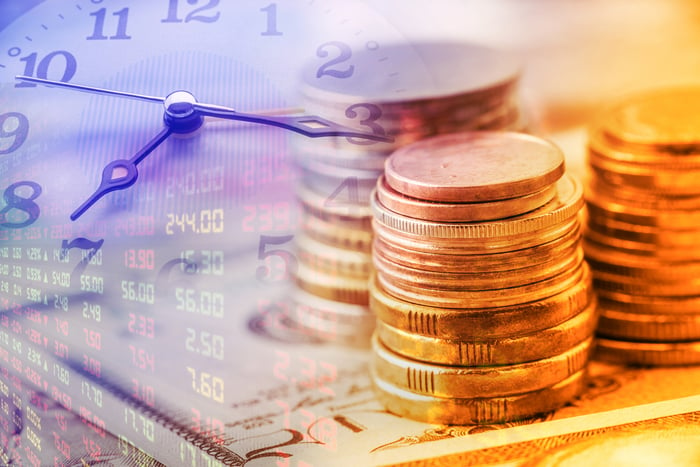When it comes to all-time investing greats, Berkshire Hathaway (BRK.A 1.18%) (BRK.B 1.30%) CEO Warren Buffett regularly finds his way toward the top of the list. Despite being par for the course relative to the benchmark S&P 500 over the past decade, Berkshire's per-share market value has outperformed the S&P 500, inclusive of dividends, by more than 2,744,000% since 1964.
Returns like this will get any money manager noticed by Wall Street. That's why investors were so eager to see what the Oracle of Omaha (as Buffett has affably come to be known) was up to during the record-breaking first quarter, which saw the S&P 500 lose up to 34% in a span of 33 calendar days.
According to Berkshire Hathaway's 13F filing with the Securities and Exchange Commission, it was an exceptionally active quarter for Buffett and his team in terms of buys and sells made, but not a particularly big quarter in terms of aggregate dollars devoted to buying and selling. Here are the three things we learned about Buffett's first-quarter moves.

Image source: Getty Images.
1. Buffett is clearly worried about stock market valuations
First off, even though Buffett spent a good portion of his company's annual shareholder meeting discussing the merits of the U.S. economy and how he'd never suggest betting against America, it's pretty obvious from his actions over the past year and change that he's very leery of stock valuations. In fact, following his speech on never betting against America, he mentioned that neither he nor his investment team have seen any attractive values.
This concern is cemented by the record amount of cash Berkshire Hathaway is keeping in its coffers. Buffett has previously opined that he feels best when Berkshire has closer to $30 billion in cash at its disposal. But following more than four years without a needle-moving acquisition, Berkshire's cash balance now tips the scales at more than $137 billion.
One last thing to consider is that while Buffett has a team of investors, he's ultimately making the big decision on an elephant-sized acquisition. Buffett has historically focused his research on financials and consumer staples, meaning he could be missing attractive deals in other sectors and industries of the market simply because of his narrow area of focus.

Image source: Getty Images.
2. His investing lieutenants are in greater control of Berkshire's investment portfolio
The second thing we learned is that Buffett's longtime investing lieutenants, Todd Combs and Ted Weschler, are likely exerting a greater influence on Berkshire Hathaway's day-to-day investments.
How do we know this? In the most recent quarter, Berkshire Hathaway completely sold out of two stocks while reducing its stake in 17 other holdings.
Some of these reductions were deliberate and expected. For instance, selling out of integrated oil and gas company Phillips 66 (PSX 0.91%) was a foregone conclusion after Buffett and his team reduced their stake from more than 80 million shares a few years ago to just 227,436 shares to end 2019. With Buffett investing $10 billion into Occidental Petroleum last year to aid in its acquisition of Anadarko, the writing was on the wall that Occidental, not Phillips 66, was Buffett's preferred oil and gas play. It also didn't hurt that Phillips 66 had delivered significant returns since 2012, making profit-taking a logical move.
However, many of these 19 sales were odd, to say the least. When Buffett sells a stake in a holding, he reduces with purpose. Most of these sales were token reductions, such as 70,000 shares sold of Suncor Energy, 4,000 shares sold of Amazon, and 5,425 shares sold of Biogen. Aside from the fact that Amazon and Biogen aren't Buffett's ponies to begin with, these small share moves suggest that Combs and Weschler are becoming more involved in Berkshire's investment activity.

Berkshire Hathaway CEO Warren Buffett at his company's annual shareholder meeting. Image source: The Motley Fool.
3. Buffett's favorite stock continues to be his own company
Finally, we learned that the only apple that's currently in Buffett's eye is none other than his own company, Berkshire Hathaway.
During three stretches in the first quarter, Buffett repurchased almost $1.6 billion worth of Berkshire Hathaway's common stock. This follows approximately $5 billion worth of repurchases in 2019 and well over $1 billion in repurchasing activity in 2018.
In order for Buffett to move forward with share repurchase activity, two criteria need to be met. First, Berkshire must have more than $20 billion in cash on hand, and second, Buffett and his right-hand man, Charlie Munger, need to agree that Berkshire is trading for a sizable discount to its intrinsic value. The first stipulation is easily met, with Berkshire ending Q1 2020 with a record $137 billion in cash and cash equivalents. The second qualification, while arbitrary, overwhelmingly suggests that Buffett views Berkshire Hathaway as a value.
There's certainly some merit to Buffett's thesis that his company is attractively valued. As of this past weekend, Berkshire Hathaway's Class A shares (BRK.A) were just 15% above their book value. Comparatively, Berkshire has ended each of the previous seven years at a share price that's ranged between 31% and 59% above book value. Based on these year-end values, Berkshire hasn't been this cheap in about a decade.
As a reminder, buying back stock can have a positive impact by reducing the number of shares outstanding and lifting earnings per share, thus making a stock look more fundamentally attractive.





